- Home
- Lily Baldwin
The Courageous Highlander
The Courageous Highlander Read online
The Courageous Highlander
Lily Baldwin
Published by Lily Baldwin, 2019.
This is a work of fiction. Similarities to real people, places, or events are entirely coincidental.
THE COURAGEOUS HIGHLANDER
First edition. November 30, 2019.
Copyright © 2019 Lily Baldwin.
Written by Lily Baldwin.
Table of Contents
Title Page
Copyright Page
Dedication
Chapter One
Chapter Two
Chapter Three
Chapter Four
Chapter Five
Chapter Six
Chapter Seven
Chapter Eight
Chapter Nine
Chapter Ten
To my daughter. You are my heart, my strength, and my joy.
Chapter One
Laird Owen MacArthur scaled the steep precipice of Beinn Dìomhair, which meant “secret mountain”. It was so named because its snow-capped pinnacle was hidden from view by the surrounding Ceòthach Mountains, and only from the summit of one of the neighboring peaks could Beinn Dìomhair be seen. Despite its lesser height, it was treacherous—steep and covered with ice and snow that never melted, not even when the clan fires burned at midsummer. At Samhain, Beltaine, and Lughnasa, fae voices carried on the winds that barreled off its side, and orbs of light sometimes danced along its surface, alluring and threatening all at once.
Throughout centuries, few had dared scale the secret mountain—and why should they? Most of the clans in the West Highlands made their home in the green Ceòthach foothills and valleys.
But not Clan MacArthur.
They were a mountain people and each year their fate was tied to Beinn Dìomhair.
Centuries before, when the first MacArthur chieftain sought to escape the violent clashes between Highland clans, he claimed undisputed lands high within the stark and craggy range. But following Yule, when ice and snow blanketed the mountains, the ground refused the spade and game became scarce. Soon, his people grew weak with hunger, making them vulnerable to disease. And so the MacArthur set out alone, determined to shoot a stag and feed his kinsmen.
After days of withstanding relentless storms and trudging through waist-deep snowdrifts, he’d nearly given up all hope. But then he spotted a mighty stag still fat from summer’s bounty. He tracked the animal up the side of the tallest mountain, but when he crested the summit the stag was nowhere to be seen. Dejected, he hung his head and looked down from the precipice and saw Beinn Dìomhair for the first time. The mysterious mountain rose up amid its tall brothers, smaller in size but sharp, its steep sides unforgiving. Yet, somehow, there on that unwelcoming peak, with its hooves planted firmly on the secret mountain’s side, was his prize. Refusing defeat, the ancient laird began to descend toward the beast. But the harsh wind carried the song of the winter fae, warning him to turn back or else face certain doom, and in that moment, his courage failed.
Overcome by fear, he returned to his mountainside village, carrying only a mantle of shame.
Without meat, many of his kin starved or succumbed to illness. Humiliated and bereaved, the laird, too, surrendered to death, but before he drew his last breath, he prayed that his son would be a better and braver man than he.
And his son was...
The first winter of his chiefdom, he trekked to the crest of the secret mountain and shot an arrow straight through the heart of the very stag his father had failed to kill. Triumphant, he climbed down the treacherous pass to his people with the mighty stag draped across his broad shoulders.
From that year on, on the final day of Yuletide, the chieftain of Clan MacArthur set out to shoot a stag on the summit of Beinn Dìomhair. He made this journey alone—his warriors were forbidden to aid his quest.
Now, armed with a bow and a courageous heart, Laird Owen MacArthur carried on this tradition.
Keeping his distance, he followed a stag with noble antlers that branched well beyond the breadth of its strong hindquarters. It was nimble and graceful and moved with ease through the icy terrain in a way that must have been a gift from the fairfolk who were guardians of the beasts of the mountains.
More than once, he closed in on the stag and could have taken a shot that would have injured the animal, but to do so would have angered the fairies. He needed the point of his arrow to drive through the heart, bringing about a swift and clean death, which meant he had to be close enough and in the right position. That hour would come. Experience taught him that the stag would tire first, but not for some time. And so, he patiently trailed behind, watchful, waiting...
Frigid air chilled Owen’s throat, blasting his lungs with frost. Still, he did not shiver or hide from the cold. He was accustomed to the biting pain and no longer heard his hands and feet scream, for he was as much a part of the mountains as the jutting stones, steep facades, and the snow that blanketed it all.
Over the centuries, his people had carved their lives into the very sides of the tall peaks. Their castle was not laid stone by stone, but rather cut into the rock, just as the village homes and pathways were built into the mountainside.
He and his kin seldom went to the base of the Ceòthach Mountains where the bottom dwellers, as they called them, lived, and only met with members of different clans when travelers crossed the mountains to reach the western islands, rather than take the longer route around the vast range. But Clan MacArthur was different from other Highland clans. The mountains had made them so.
They wore layers of fur over their plaids most of the year. Because walking from one end of their village to the other meant a long, steep trek down and then back up again, even the women and children were rugged with strong, muscular legs. In the short growing season, they planted crops on leveled beds with stone ledges that kept the soil from washing away when it rained. They hunted and preserved game and wild roots and herbs, which they foraged in the lower forests. But closer to the mountain summits only stone flourished, which was a constant reminder that scarcity was never far away.
Year after year, when even the most rugged of beasts would dare not leave their burrows, his clan had learned to survive. Families banded together in their carved and tunneled huts, huddling close to share warmth, telling stories while storms raged and brutal winds hollered, pummeling the mountains—but like the towering peaks—his people gave no quarter nor would their laird...
Pulling the hood of his fur lower over his brow, he followed the beast ever higher. When the stag stopped for a moment’s rest, Owen, too, sat down on a smooth surfaced rock. He gazed out upon the world of the bottom dwellers. Rolling moorland, brown and somber, stretched out below him to the east. Occasionally, a patch of frost or snow broke up the monotony of faded winter grass. The surrounding land was hardly tame. In winter, the bottom dwellers had their own hardships. Still, he knew it was another world down below, one that was not nearly as cold or harsh as life on the mountains.
Withdrawing his costrel from his satchel, he drew a long sip of ale before returning it. Then, he bit into a piece of dried meat. A gust of fae wind blasted him, warning him to turn back, telling him the mountaintop was no place for men at that time of year. Standing, his stance spread wide, he turned into the wind, refusing to yield. He let his hood fall back and lifted his face to the cold sun, willing the golden orb’s distant warmth to reach him and aid his quest. “I ask nothing for myself,” he shouted. “I do this for my people.”
But the sun, favoring the earth and those things which grew—the things men cut down, cared not whether the world of men survived. Bestowing upon Owen only cold, white light, the sun ignored his plea. Still, he did not smite it wit
h thought or shake his fist at its stingy supply. He only prayed and would continue to pray everyday until spring renewed and life could once more flourish. Pulling his hood back over his head, Owen followed after the stag that had continued its ascent.
And then it was, as though for the very first time in all his life, the sun seemed to hear his prayer.
A light, warm and golden, appeared before his eyes, dancing with slow, languid movements. It mesmerized, shining with bright magic, but Owen knew not which sort of magic—that which healed or that which destroyed? The light moved further up the mountain, following the path the stag had taken.
“’Tis a good omen,” he exclaimed, feeling as though the sun had, indeed, joined his quest. Now, with the Heavens on his side, he was sure to catch the beast and bring good fortune to his people.
The golden light waned and then grew bright once again, landing on a jutting rock and then onto a patch of ice, which gleamed blue in the cold. His heart warmed at the sight of the orb as though its heat had entered his soul. And then he realized that it was no simple illusion. His limbs were, indeed, growing steadily warmer. Throwing back his hood, he stretched his hands that ached no longer. Filled with vigor, he charged forward and raced after the light. Scaling the summit, he dug his fingers into the ice, pulling himself higher and higher. But when he crested the very top, he could no longer see the orb.
Despair took hold with a ferocity that swept the warmth from his lungs, leaving his body colder than before.
“Where are ye?” he shouted.
He jerked his head left, then right, realizing he had also lost sight of the stag, so singular had he been in his pursuit of the light. He scurried over jagged rock, slipping and falling as he went. His heart now felt as barren as his surroundings. Then, at long last, he glimpsed the orb again. His gaze fixed on it as he rushed forward, heedless of the ice. He could not lose a gift from the Heavens again. Scampering to the other side of the peak, he followed as it began to quickly descend. Then it dipped out of sight beyond a large drift of snow.
“Nay,” he cried, running after it, but he lost his footing and fell. Sliding, he grappled for something to hold, clawing at smooth rock and soft snow, which escaped his grasp. He plummeted off the cliff. With a thud, he landed on a ledge, the snow cushioning his fall. His relief was short-lived. The mountain rumbled. His arms crossed to cover his face the instant before an avalanche of snow buried him.
Beneath the weight of winter’s tomb, he could barely lift his chest to draw breath. Cold pulsed through his body.
Death was upon him.
He could feel its cold hand on his heart.
But what of his people, his mind screamed.
And then, all that remained was sorrow as he faded into nothing.
Chapter Two
Owen’s hand dug into something soft and warm, and a sweet smell surrounded him. His heavy limbs tingled while he lay unmoving on his back. He opened his eyes, but then slammed his lids shut against the bright light. Using his hand to shield his face, he looked again. To his surprise, it was the sun that glowed so brightly. Once more, closing his eyes, he lifted his face, savoring the heat.
Heat? But winter was far from over.
He opened his eyes again. About his head danced meadow foil seeds, which drifted on the breeze, looking for their spot to settle and grow. Leaves spread out overhead from the limbs of mighty trees that surrounded the glade in which he’d awoken. His hands curled into moist, fertile earth, and of all things, he appeared to by lying on a bed of heather. His eyes widened as a Crested Tit flew overhead with twigs in its beak to build a nest.
How could spring have come already?
He jumped to his feet and ran his hands over his face and body to be sure he wasn’t a spirit. He felt the same, but everything around him had changed.
Had the Heavens answered his prayers by giving his people an early spring?
The thought that followed pushed his happiness aside and doom gripped his heart...Had he died on the mountain and now gazed upon the afterlife?
He scanned his surroundings. There was nothing otherworldly in what he saw. Then his eyes were drawn to red lines dripping from small gashes down his legs. He swiped at his calf and looked for a moment at the smear of blood on his fingers.
There was no bleeding in Heaven.
He knew in that moment that he was very much alive. Drawing his sword, he squared his shoulders. No matter what had occurred, he could not linger. Surely his people were anxious and needed their laird to calm their fears. He crossed the glade into the forest, his steps cushioned by the heather.
Pausing, he ran his hand over the bristly nettles of Scots Pines, then bent his head back, to see the treetops. The evergreens towered above him. Fresh apprehension pricked his brain. Trees this tall did not grow in the mountains.
It then occurred to him, that he might have slid all the way to the base of the secret mountain, to which he had never ventured. Mayhap, if the peak was always covered in snow, it stood to reason that the base may always enjoy the lushness of summer.
He blinked up at the bright warm sun to gauge his direction. With confidence, he turned to the left and ducked beneath a fallen tree held up by the might of its neighbor, then he proceeded onward.
The warmth felt glorious. The cold stiffness in his legs and arms melted away. Bird song filled the air, but despite the joy of his surroundings, his unease only heightened as he pushed on. Never had he seen trees so tall, and as he walked, he could have sworn that the branches parted for him. Unease swiftly became fear when he noticed the tree branches behind him close up tight like a door locked shut.
Stopping, he glanced left and then jerked around and looked behind him. The forest was swallowing him whole, closing in on him from all directions. His eyes turned heavenward, and then he saw it.
A cage was hanging from high in the treetops.
He tried to back up to get a better look, but the trees had encased him. He had no place to go but up, and so he climbed, although never had an upward ascent been so easy. He had his choice of branches upon which to step. It was as though the trees wished him to reach the cage.
When he came upon it, he pulled himself up slowly so that his eyes were level with the cage floor.
There, curled in a tight ball with a chain around her neck, was a young woman who appeared to be asleep.
His eyes traveled over her frail, pale legs. Limp, greasy black locks clung to her cheeks, obscuring her features.
“Hello,” he said gently.
Her head lifted slowly, weighted by the thick chain, and then pale violet eyes locked with his.
“Who are ye?” she whispered.
He normally would have declared his full name. He was Owen Errol Callum MacArthur. But she was shivering and so small and frail, he felt his full name too much for this fragile creature, and so he simply said, “My name is Owen.”
She eyed him curiously. “What are ye?”
Thinking her question strange, he replied the only way he knew how. “I am laird of my clan.”
“Ye’re mortal, aren’t ye? A...a...human?”
“Of course I’m human. Aren’t ye?”
Shame filled her eyes the instant before she dropped her gaze, her hair falling in front of her face like a ragged curtain. “I was once human like ye, but that time was long ago. Now, I’m only a slave.” Then she looked up, fear bright in her eyes. “And my master is not far. Ye must leave.”
“What sort of man is yer master?”
Coming to her knees, she gripped the bars, her knuckles white from the strain. “Cranor is no man. Please, just go. Go, before it’s too late.”
He shook his head. “Ye don’t know what ye’re saying. I’ll not leave ye here, caged like a dangerous animal.”
“But...mayhap I am dangerous.”
“Ye?” he said in disbelief, taking in her slim frame and fear-filled gaze. “Ye’re naught but skin and bone. Ye couldn’t hurt someone if ye tried.”
; She winced and swallowed hard, pulling at the chain around her neck. “Ye needn’t brawn to make someone bleed. Some wounds cut deeper than the flesh—they cut soul-deep.”
The more he looked into her sorrowful, pale violet eyes, the more he wished to save her. “We’ve all made mistakes, and I see remorse in yer gaze.” He gestured to the cruel cage. “And clearly ye’ve paid a great penance for yer sins.”
Her eyes flashed with anger, anger he knew was directed inwardly. “Some of us are beyond redemption.” She started to back away from the bars, shaking her head slightly. “Please, do not add yer life to my list of transgressions. Go. Go back from whence ye came before it’s too late.”
Ignoring her, Owen drew the dirk from his boot and grasped the large lock in his hand.
A bitter laugh fled her lips. “Ye toil for naught. The lock is cursed. No one but my cruel master can free me.”
Owen refused to believe that. “No man has the right to enslave another.”
“I’m cursed by my own treachery. Please, leave me!”
The plea in her voice beckoned his gaze, drawing his attention away from the lock.
Her shoulders were stooped with shame. “I’m not worth saving.”
He looked her hard in the eye. “Every soul is worth saving.” Then he firmly inserted the tip of his blade into the lock.
“Ye’re wasting time. ‘Tis futile. Leave me. Ye must flee!”
Paying her no heed, Owen twisted the blade and it sprang open. His own eyes flashed wide with surprise at the ease of his success.
“How?” she gasped in awe. Her body trembled. “I...I don’t understand.”
“And ye said it couldn’t be done,” he said, smiling broadly.
Trembling, she drew away, staring at him with new scrutiny. Then her body softened and warmth filled her eyes, darkening the violet hue to a rich purple but only for a moment. An instant later, the color faded. She scurried toward him, weighed down by the chain around her neck. Sweeping her tangled hair down her back, she thrust her chest out and stretched her head back, exposing her neck.

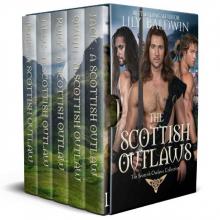 The Scottish Outlaws Collection, Books 1 - 5
The Scottish Outlaws Collection, Books 1 - 5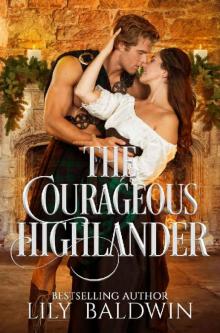 The Courageous Highlander
The Courageous Highlander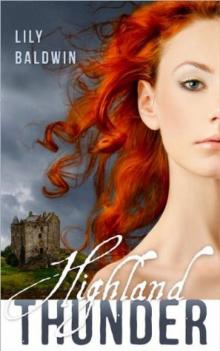 Highland Thunder (Isle of Mull Series)
Highland Thunder (Isle of Mull Series)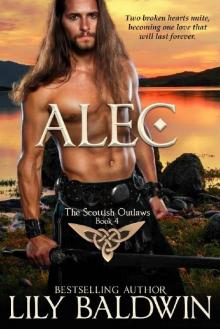 Alec: A Scottish Outlaw (Highland Outlaws Book 4)
Alec: A Scottish Outlaw (Highland Outlaws Book 4)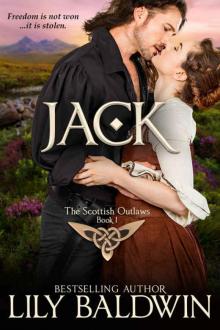 Jack: A Scottish Outlaw (Highland Outlaws Book 1)
Jack: A Scottish Outlaw (Highland Outlaws Book 1)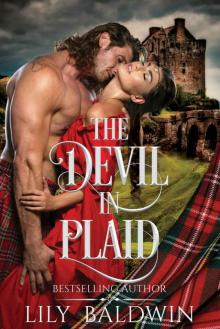 The Devil in Plaid
The Devil in Plaid Fallen Angel
Fallen Angel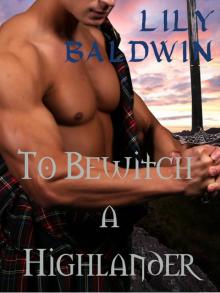 To Bewitch a Highlander
To Bewitch a Highlander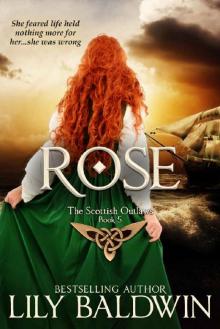 Rose_A Scottish Outlaw
Rose_A Scottish Outlaw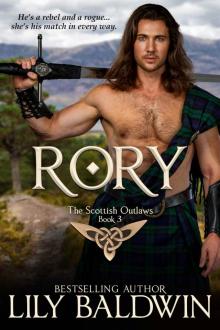 Rory: A Scottish Outlaw (Highland Outlaws Book 3)
Rory: A Scottish Outlaw (Highland Outlaws Book 3)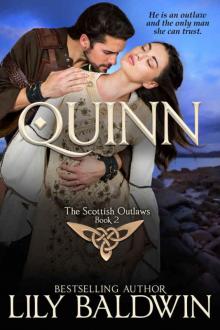 Quinn: A Scottish Outlaw (Highland Outlaws Book 2)
Quinn: A Scottish Outlaw (Highland Outlaws Book 2)